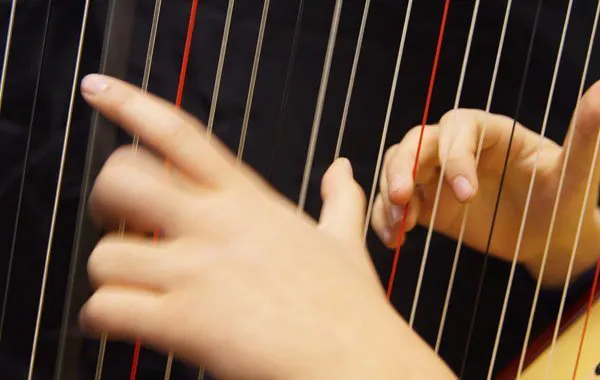Basic Harp Courses

Harp Courses for Children and Adolescents
Learning to play the harp for children has the charm of a fairy tale, beginning with the first encounter with this ancient and magical instrument. The harp course for children and adolescents at the Scuola di Musica di Fiesole offers young students (from age 6) a formative yet enjoyable approach to harp studies, focusing on listening, coordination, and imitation.
Children can start playing the harp at an early age. The school’s teaching approach immediately incorporates group activities and play-based methods to help students become comfortable with the instrument, understand basic musical concepts, and produce sound. Alongside individual harp lessons, the harp courses at the Scuola di Musica di Fiesole provide a valuable experience for students through recitals and concerts.
The goal of the harp course for children and adolescents is to guide students from their first interactions with the instrument to playing increasingly complex harp repertoire, and, if they reach an adequate level of preparation, to undertake an academic path.
The school also offers non-curricular harp courses, which are not tied to exams but maintain a rigorous standard in developing harp-playing skills.
Harp lessons at the Scuola di Musica di Fiesole begin with an introduction to the instrument, explaining the harp’s structure, parts, and sound production, as well as demonstrating correct posture. By imitating the teacher’s gestures, students familiarize themselves with the strings, identifying foundational sounds to start playing simple melodies. At the same time their ears are trained to perceive pitches and the quality of the harp’s sound while developing relaxed, fluid gestures.
New harp students join group activities from the beginning, such as their first theory class, the Children’s choral workshop. Here, they learn basic musical concepts like sound, silence, duration, and pitch through games that foster sound production, motor coordination, and interaction with classmates.
Young harpists can play alongside their peers from the start, participating in the Orchestra Piccolissimi Musici activities.
As harp studies advance, students explore the instrument’s potential by moving from simple melodies to more complex compositions, gaining increased independence of the fingers and hands. They gradually learn pedal use and acquire the necessary coordination between upper and lower limbs. By practicing on music suited to their level, they steadily improve in agility, precision, and expressive execution, focusing on phrasing and sound quality.
To solidify their knowledge and abilities, regular attendance in harp lessons is recommended, along with individual daily practice (starting with a few minutes, gradually increasing over time) to implement the teacher’s advice and play with increasing confidence and awareness.
The harp repertoire is rich and varied, with many fine transcriptions and compositions originally written for piano. As students gain practical and theoretical skills, they are able to play increasingly interesting, complex, and rewarding pieces.
The pre-academic harp course progresses through various stages, with teachers providing consistent support and encouraging student commitment.
The skills acquired are assessed through certification exams, allowing students to progress from beginner to intermediate and then advanced levels. Each level includes complementary courses in the harp curriculum, such as chamber music and collective classes in music history and theory.
Upon completing this harp study program, students will have the foundation needed to tackle increasingly challenging repertoire, potentially leading to entry into an academic harp program.
Additionally, non-curricular harp lessons are available for those who wish to study outside a structured curriculum. These courses, while aiming for high-quality standards consistent with the school’s standards, do not include exams.
Performing in public is not only an essential part of a musician’s development but also a highly valuable experience for all children and adolescents. To this end, the school organizes recitals, concerts, and other performance opportunities involving harp students, both individually and in small ensembles.
Before beginning harp lessons, students are encouraged to take preparatory courses to help familiarize them with the instrument. For children aged 0 to 6, the school offers “Musicami,” a music course based on E. Gordon’s Music learning theory, and rhythmic-choral activities for children aged 3 to 9.
children and adolescents
from June 1st to September 1st
from September to June
variable based on ISEE. Please click “Fees” button for details
if places are available, it is possible to enroll during the course of the year